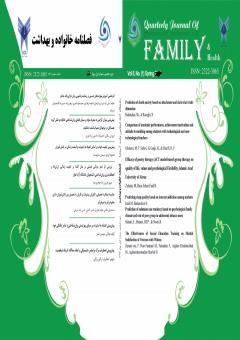نقش میانجیگر خودمراقبتی در پیشبینی خودمهارگری و انتظارات پیامد براساس اضطراب سلامت در بیماران مبتلا به سندرم روده تحریکپذیر
محورهای موضوعی : روانشناسیمژگان مومنی 1 , مریم بهرامی هیدجی 2 , زهره رافضی 3
1 - گروه روانشناسی عمومی، واحد کرج، دانشگاه آزاد اسلامی، کرج، ایران. golroz.2028com@gmail.com
2 - گروه روانشناسی، واحد کرج، دانشگاه آزاد اسلامی، کرج، ایران. (نویسنده مسئول) bahrami_h3@yahoo.com, tell: 09120522462,
3 - گروه روانشناسی بالینی دانشکده روانشناسی و علوم تربیتی دانشگاه علامه طباطبائی
کلید واژه: انتظارات پیامد, اضطراب سلامت, خودمراقبتی, خودمهارگری, سندرم روده تحریکپذیر,
چکیده مقاله :
چکیده مقدمه: سندروم روده تحریکپذیر از پر هزینهترین بیماریهای دستگاه گوارش است که سبب اختلال در عملکرد روده میشود. هدف از انجام پژوهش حاضر بررسی نقش میانجیگر خودمراقبتی در پیشبینی خودمهارگری و انتظارات پیامد براساس اضطراب سلامت در بیماران مبتلا به سندرم روده تحریکپذیر بود. روش پژوهش: پژوهش حاضر، توصیفی و از نوع تحلیل مسیر است. جامعه آماری این پژوهش را کلیه بیماران مبتلا به بیماری سندروم روده تحریکپذیر، مراجعه کننده به مراکز درمانی در شهر تهران تشکیل دادند. نمونه گیری پژوهش حاضر از نوع هدفمند میباشد و تعداد 200 نفر از بیماران مبتلا به سندروم روده تحریکپذیر، پرسشنامه های پژوهش را تکمیل کردند. ابزار پژوهش شامل پرسشنامه خودمراقبتی توبرت و گلاسگو، پرسشنامه خودمهارگری تانجی، پرسشنامه انتظارات پیامد ووسیچکی و همکاران، پرسشنامه اضطراب سلامت سالکوسکیس و وارویک بود. جهت تحلیل دادهها از نرم افزار SPSS-26 و AMOS استفاده شد. یافته ها: نتایج نشان داد که اضطراب سلامت هم به صورت مستقیم و هم با میانجیگری خودمراقبتی، خودمهارگری و انتظار پیامد را در مبتلایان به سندرم روده تحریک پذیر پیش بینی می کند. همچنین خودمراقبتی در مبتلایان به سندرم روده تحریک پذیر خودمهارگری را پیش بینی می کند. خودمراقبتی در مبتلایان به سندرم روده تحریک پذیر انتظار پی آمد را پیش بینی می کند. نتیجه گیری: در نتیجه توصیه می گردد هر بیمارستانی یک روانشناس سلامت داشته باشد به عنوان فردی که کنترل خشم، جرأتورزی، مهارت در نه گفتن و یا حتی آموزش برای مقابله با شرایط استرسزا را به بیماران آموزش دهد تا آنها بتوانند در زندگی عادل خود از این مهارتها استفاده کنند.
Abstract Introduction: Irritable bowel syndrome is one of the most expensive diseases of the digestive system that causes intestinal dysfunction. The purpose of this study was to investigate the mediator role of self-care in predicting self-control and outcome expectations based on health anxiety in patients with irritable bowel syndrome. Research method: The current research is descriptive and path analysis type. The statistical population of this research was made up of all patients with irritable bowel syndrome who referred to medical centers in Tehran. The sampling of the current research is purposeful and 200 patients with irritable bowel syndrome completed the research questionnaires. Research tools included Tobert and Glasgow's self-care questionnaire, Tanji's self-control questionnaire, Vosichki et al.'s outcome expectations questionnaire, Salkoskis and Warwick's health anxiety questionnaire. SPSS-26 and AMOS software were used for data analysis. Findings: The results showed that health anxiety predicts both directly and through the mediation of self-care, self-restraint and expectation of outcome in patients with irritable bowel syndrome. Also, self-care predicts self-control in patients with irritable bowel syndrome. Self-care predicts expected outcomes in patients with irritable bowel syndrome. Conclusion: As a result, it is recommended that every hospital has a health psychologist as a person who can teach patients how to control anger, courage, skills in saying no, or even training to deal with stressful situations so that they can live a just life. Use these skills.


